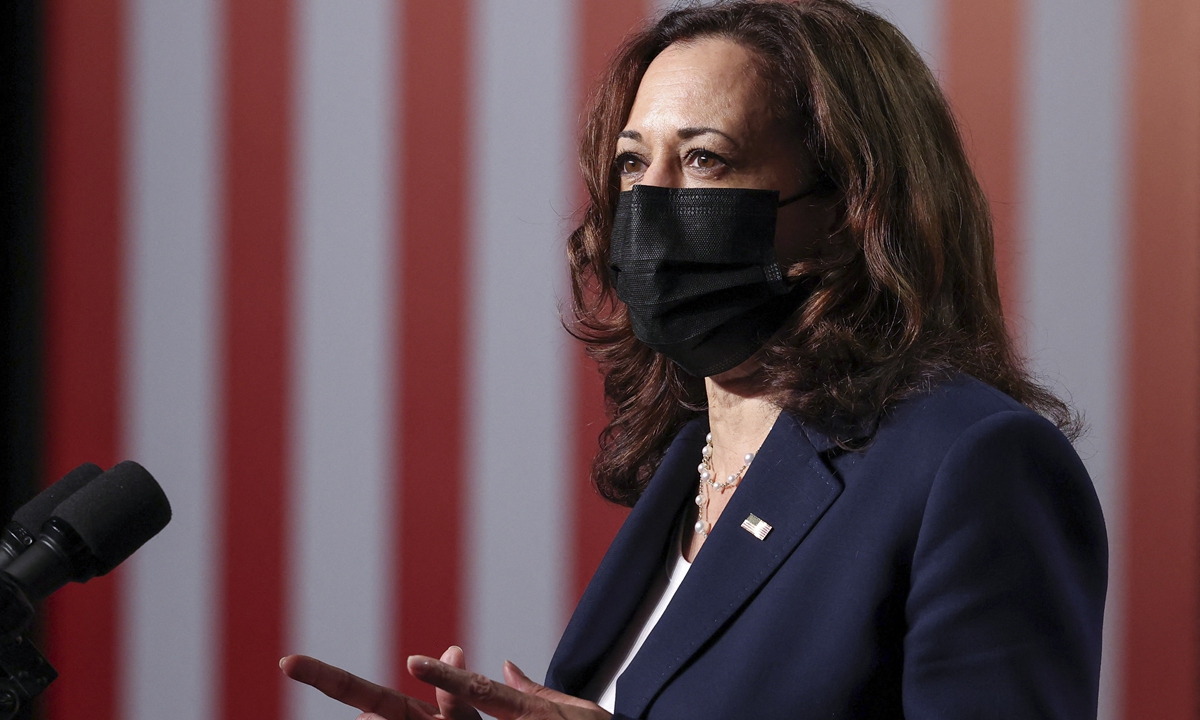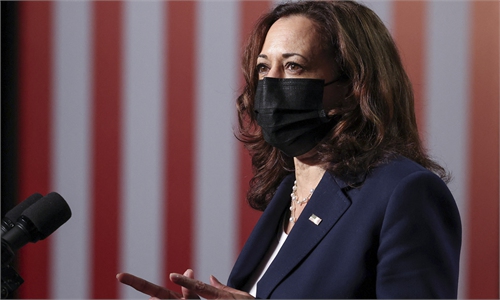Harris visits Japan, takes Abe’s controversial state funeral as chance to push US’ geopolitical strategy

US Vice President Kamala Harris. Photo:AFP
Before attending the state funeral for assassinated former Japanese leader Shinzo Abe, US Vice President Kamala Harris had a meeting with Japan's Prime Minister Fumio Kishida on Monday to reaffirm the US-Japan alliance. However, analysts said that Harris' visit to Japan is more about helping Japan "save face" as no head of state from Western countries will attend the controversial state funeral. They also warned that regional countries should keep on high alert as Japan has ramped up efforts to expand military strength and invite more external forces into the region.
On Monday, Harris had a meeting with Japan's Prime Minister Fumio Kishida, during which she said, "The alliance between Japan and the United States is a cornerstone of what we believe is integral to peace, stability and prosperity in the Indo-Pacific region," AP reported.
Harris will lead the US delegation to attend the state funeral for former Japanese prime minister Shinzo Abe, who was shot and killed while delivering a campaign speech in July.
At the Monday meeting with Harris, Kishida also talked about Abe and praised the former Japanese leader for pouring "his heart and soul" into strengthening ties between Japan and the US.
There is nothing new about the issues that Harris and Kishida have talked about, since the latter had recently met with US President Joe Biden on the sidelines of the UN General Assembly in New York - Japan wants more support from the US to expand its military strength and influence in the region while the US wants Japan to better cooperate with its Indo-Pacific Strategy, Da Zhigang, director of the Institute of Northeast Asian Studies at Heilongjiang Provincial Academy of Social Sciences, told the Global Times.
One of the main purposes of Harris' visit to Japan is to attend Abe's funeral and "save Japan's face" as no head of state from the G7 countries will attend. To the Kishida government, putting bilateral and multilateral relations on the agenda of Harris' visit in Japan will "add importance" to it, and such a move can flatter Harris and help shift Japan's domestic dissatisfaction away from Abe's funeral, Da said.
The expert noted that Japanese PM Kishida has suffered from "new low" approval ratings and the government has been battered by severe inflation, as well as his party's ties to the controversial Unification Church.
According to a recent survey conducted by Nikkei Asia, the approval rating of Kishida's cabinet stood at 43 percent, down from 57 percent in August, which marked a low for the government since it was formed in October 2021. The ratings have declined for four straight months.
Moreover, Kishida's decision to hold a state funeral for Abe has also drawn a public backlash and protests in recent months. According to Kyodo News, last week, an elderly man set himself on fire in protest against Abe's state funeral.
According to a White House statement, Harris and Kishida also talked about the Taiwan question and criticized China, while analysts said that it has always been Japan and the US that have made provocations and used related topics to expand Japan's military strength.
The US and Japan may also regard Abe's funeral as a major event to further demonstrate the strength and importance of their alliance. Also, through the state funeral, the Kishida administration will follow Abe's diplomatic line, which is essentially the so-called free and open Indo-Pacific Strategy, said Liu Jiangyong, vice dean of the Institute of Modern International Relations at Tsinghua University.
Later this year, the most important item on Japan's agenda is revising or formulating a new national security strategy, as well as the defense program outline, greatly increasing military expenditure, and strengthening the military deployment in the southwest islands. Japan is likely to further communicate with the US over those plans, Liu told the Global Times.
Harris may also make some symbolic gestures in support of Japan's development of its military and security forces. As the US is overwhelmed with its global military deployment, the US wants Japan to play its role to the utmost in the Asia-Pacific region, Liu noted.
Apart from attending Abe's funeral, Harris is also expected to inspect troops at the US naval base in Yokosuka, southwest of Tokyo, on Wednesday. After Japan, the US vice president will also visit South Korea. Asia Today reported on Saturday that Harris will meet with South Korean President Yoon Suk-yeol.
Harris will try to broker a deal between Japan and South Korea as part of her visit. She is expected to emphasize her support for the improvement of South Korea-Japan relations, as it is urgent that the US rebuild the military cooperation system of the US, Japan and South Korea against China and North Korea in the Asia-Pacific region, said Liu, noting, however, that it is difficult to set up this triangle alliance due to the contradictions and mistrust between South Korea and Japan.
Details of Yoon and Kishida's meeting on the sidelines of the UN General Assembly highlighted the frictions between the US' allies, some observers said, as media reported that Kishida had denied a message from the South Korean Presidential Office on the two leaders' meeting on September 21, while later Seoul and Tokyo used different language to describe the exchange between Yoon and Kishida - Seoul called the meeting an "informal talk," but Tokyo defined it as "a short chat."
Apart from Harris, British Foreign Secretary James Cleverly will reportedly visit Japan and attend Abe's funeral, and will later visit South Korea and Singapore from Monday.

